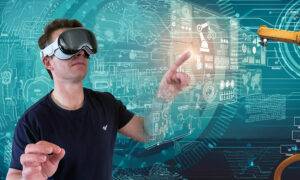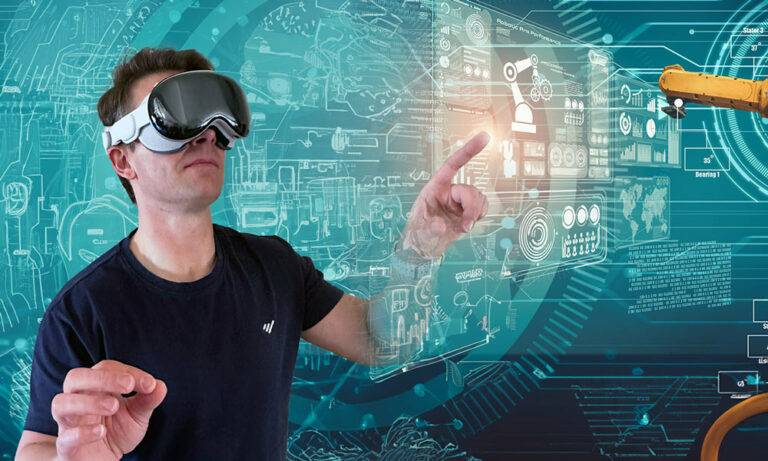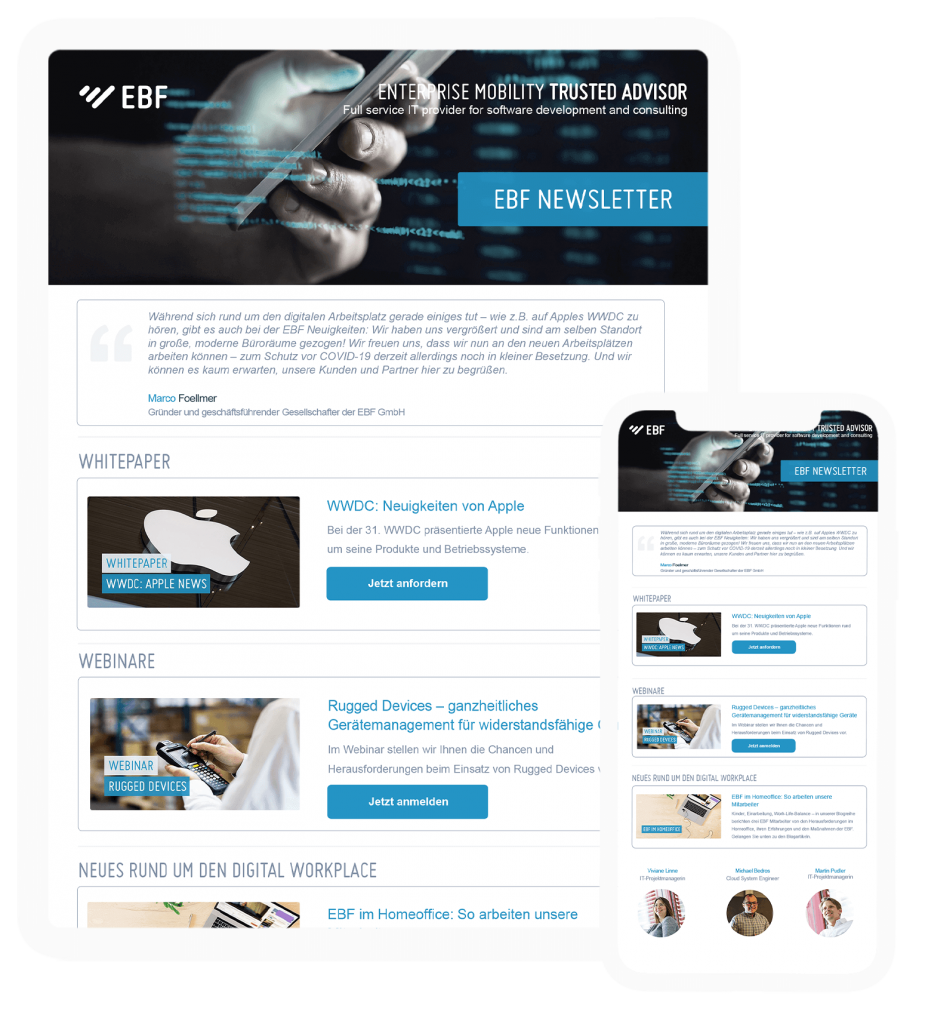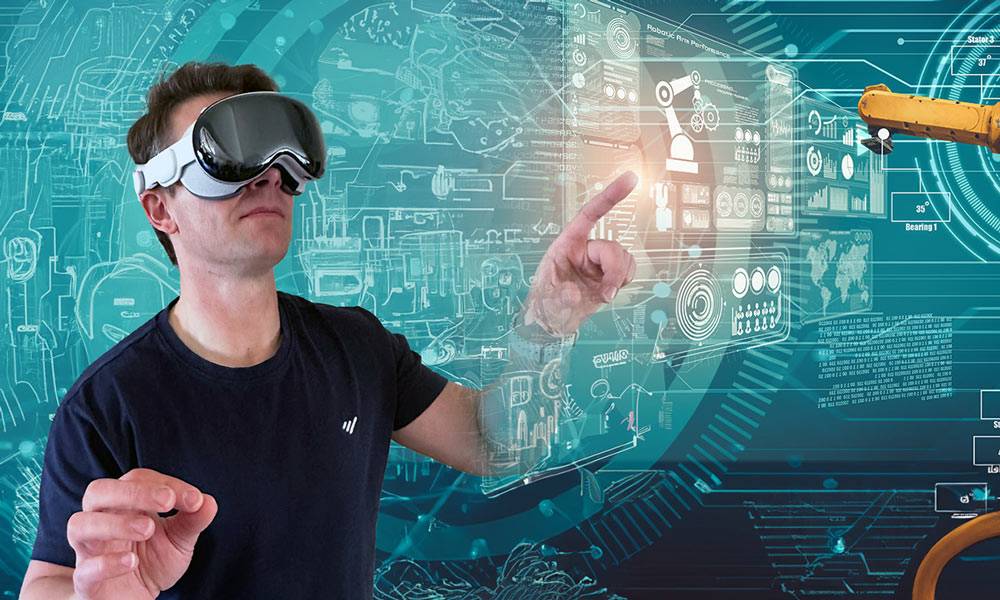Stepping into the realm of innovation, the Apple Vision Pro has captured the imagination and attention of both private consumers and companies alike. Many people are excited to see what Apple’s new hardware can do. Our colleague Thomas Steinmetz from EBF Inc. had the opportunity to delve into the world of Apple Vision Pro recently and has tested it. The experience left him both impressed and contemplative.
In our blog article you can read a concise breakdown of his impressions and his assessment of potential applications for companies:
+
Pros of the Apple Vision Pro
Intuitive use
If you already use an iPhone, it won’t take you long to find your way around. Apps and buttons are where you expect them to be. Operation by eye, voice and gestures is simple and intuitive and the device responds surprisingly quickly and well thanks to several cameras, sensors and microphones. With other models, however, external controllers are usually required for control.
Quick dive into Augmented and Virtual Reality
With a simple button press, users are transported into a virtual realm while maintaining a unique connection to the physical world. Users can still see their arms, hands and, depending on their wishes, parts of the environment – a clear advantage compared to other models. They can decide for themselves to what extent the real and virtual worlds merge.
Augmented reality means that digital elements (e.g. apps) are integrated into your own environment. Virtual reality, on the other hand, refers to immersion in a digital world – in other places, in films, etc.
Convenient use
Unlike previous experiences with other VR glasses that induced discomfort, the Vision Pro manages to strike a balance, offering a nausea-free immersive experience – at least for the period in which Thomas has tested it. However, this could be different if used for longer periods.
Impressive Resolution and Low Latency
The display quality and minimal latency of the Apple Vision Pro is nothing short of impressive. They contribute to an immersive experience and open up many areas of application for the headset. After all, high image quality and instant image transmission are essential for many application scenarios. Especially in moving environments, delays and inaccuracies can be dangerous.
–
Cons of the Apple Vision Pro
No seamless integration with the real world
The displayed content currently only connects with the real world to a limited extent. After all, the Apple Vision Pro falls short in projecting hologram-like content directly onto small, spectacle lenses and seamlessly connecting it to the real environment. Instead, the Apple Vision Pro is still a rather large, bulky device that transports the users into a largely isolated space – despite the already existing merger of the worlds. This can work well in controlled environments, such as the office. But isolation could cause difficulties when it comes to actions and real-world navigation, particularly in environments such as warehouses and production halls where movement is frequent and varied. Despite the Apple Vision Pro’s display quality and low latency, this limitation may hinder its widespread adoption for everyday use at the moment, especially in dynamic, mobile scenarios. However, this is a problem that models from other manufacturers also face.
Low battery life
The battery of the Apple Vision Pro only lasts around 2 hours. Although wired operation is possible, this is often a hindrance in mobile scenarios and limits use.
Low UEM support
One of the greatest downsides is currently the low UEM support. It may therefore take some time for the Apple Vision Pro with its operating system visionOS to catch up for secure and easy commercial use. Competitors currently have an advantage here: they offer devices with similar functions – at lower prices and with more extensive management options. These devices can already be managed by standard UEM systems. However, it’s anticipated that Apple will also open APIs to UEM vendors to allow more extensive Apple Vision Pro management in due time. Apple-specific UEM systems such as Jamf will certainly be the first to implement this in their solution – but other UEM systems will not wait long either.
Conclusion and a look at future applications
The Apple Vision Pro caused a lot of excitement when it was launched and is certainly one of the most powerful models of its kind. However, it is clear that spatial computing as a whole is still in its infancy. Apple and other manufacturers will certainly continue to work intensively on merging the real and virtual worlds even better in the future. Some fundamental challenges may only be solved with future models. It will probably be some time before then.
However, further management options for the Apple Vision Pro will certainly be available sooner so that it can be used in companies. It will be interesting to see which applications will be available for the Apple Vision Pro. Because they will also determine the possible uses.
When the time comes, we can well imagine that the Apple Vision Pro can be used for various business and commercial purposes.
Here are a few conceivable scenarios:

Trainings
In the healthcare sector and in technical fields, the glasses can be used to train doctors and engineers. They can train operations and production steps and thus prepare for tricky procedures. Experts from other locations can also be called in if their specialist advice is needed.
Product development
Companies can develop prototypes and view them in a realistic 3D environment. Collaboration across locations is also possible here, which can speed up development processes and save costs.
Customer experience
The experience of shopping, searching for real estate or planning a trip can also be improved. While products can be transferred to other environments, users can experience places virtually.













